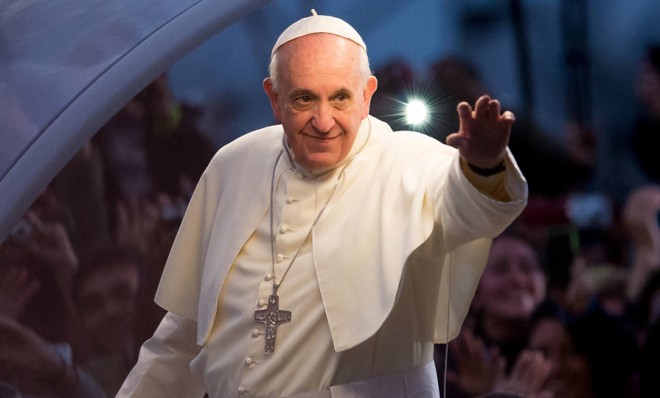Why the Pope's groundbreaking comments on gays and abortion are so smart
Francis knows what the Church needs to win back disenchanted Catholics

A free daily email with the biggest news stories of the day – and the best features from TheWeek.com
You are now subscribed
Your newsletter sign-up was successful
Pope Francis shook the Catholic world on Thursday, stating in stark terms that the Church has erred by focusing so heavily on abortion, homosexuality, and contraception, to the detriment of traditional Christian values like helping the poor.
But while Pope Francis' candor in an interview published in 16 Jesuit periodicals worldwide (including the U.S.'s America) is striking, the biggest takeaway is that the Pope has a strategy for winning back disenchanted and isolated Catholics.
His strategy relies on welcoming Catholics back to the fold without offending the traditional structure. He is steering the Church towards universally popular values and causes, like acceptance, forgiveness, and charity, while de-emphasizing controversial doctrines, such as gays and contraception.
The Week
Escape your echo chamber. Get the facts behind the news, plus analysis from multiple perspectives.

Sign up for The Week's Free Newsletters
From our morning news briefing to a weekly Good News Newsletter, get the best of The Week delivered directly to your inbox.
From our morning news briefing to a weekly Good News Newsletter, get the best of The Week delivered directly to your inbox.
Over his first six months in the Vatican, the Pope has shifted the Church towards a less judgmental approach. This change was evident this summer, when he said of gay priests, "Who am I to judge?"
His latest interview builds upon this new direction. Of gays in particular, the pope actually expanded his views beyond just priests, but without expressing support or acceptance of homosexuality. "Tell me: When God looks at a gay person, does he endorse the existence of his person with love, or reject and condemn this person?" he said. "We must always consider the person."
The Pope's words strike a careful balance, revealing an unprecedented level of acceptance to appeal to younger and progressive Catholics without overriding the Church's teachings.
This was even more apparent when he addressed criticism that he has not spoken often enough about issues pertaining to sex and procreation. "We cannot insist only on issues related to abortion, gay marriage, and the use of contraceptive methods," he said, adding, "It is not necessary to talk about these issues all the time."
A free daily email with the biggest news stories of the day – and the best features from TheWeek.com
He again stressed that on these matters "the teaching of the Church is clear." Yet he wisely recognized that these issues will diminish the Church if it is "obsessed with the transmission of a disjointed multitude of doctrines to be imposed insistently."
It is unlikely that the Pope will dramatically alter the Church's guidelines on these issues. Progressive Catholics may "want to see the Church brought into conformity with the egalitarian ethos of modern liberalism, including its embrace of gay rights, sexual freedom, and gender equality," writes Damon Linker at The New Republic, but "that simply isn't going to happen."
However, his more tolerant rhetoric may have strong appeal for modern Catholics and people across the world. Unlike the Second Vatican Council, which focused on making specific church changes, "the focus is on that internal change of heart," writes Pat Perrielo at the National Catholic Register. Pope Francis has moved from condemnation to "reminding us that the Church is meant to be a loving, caring, compassionate institution."
As the adroit Don Draper of Mad Men says, "If you don't like what is being said, change the conversation." And it is a huge compliment to the Pope that he has found a way to guide the church towards a new conversation that can excite disenchanted Catholics and foster a sense of connection to the church — all without disregarding traditionalists.
By focusing on a shift in attitude rather than doctrine, Pope Francis may achieve a near-impossible task of growing the Church's appeal while maintaining its doctrines. As Periello says, "He has yet to change anything in the Church, yet he has changed everything."
Emily Shire is chief researcher for The Week magazine. She has written about pop culture, religion, and women and gender issues at publications including Slate, The Forward, and Jewcy.
-
 What are the best investments for beginners?
What are the best investments for beginners?The Explainer Stocks and ETFs and bonds, oh my
-
 What to know before filing your own taxes for the first time
What to know before filing your own taxes for the first timethe explainer Tackle this financial milestone with confidence
-
 The biggest box office flops of the 21st century
The biggest box office flops of the 21st centuryin depth Unnecessary remakes and turgid, expensive CGI-fests highlight this list of these most notorious box-office losers